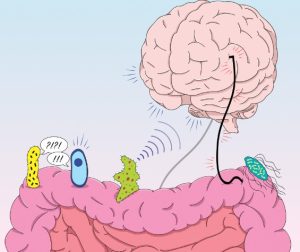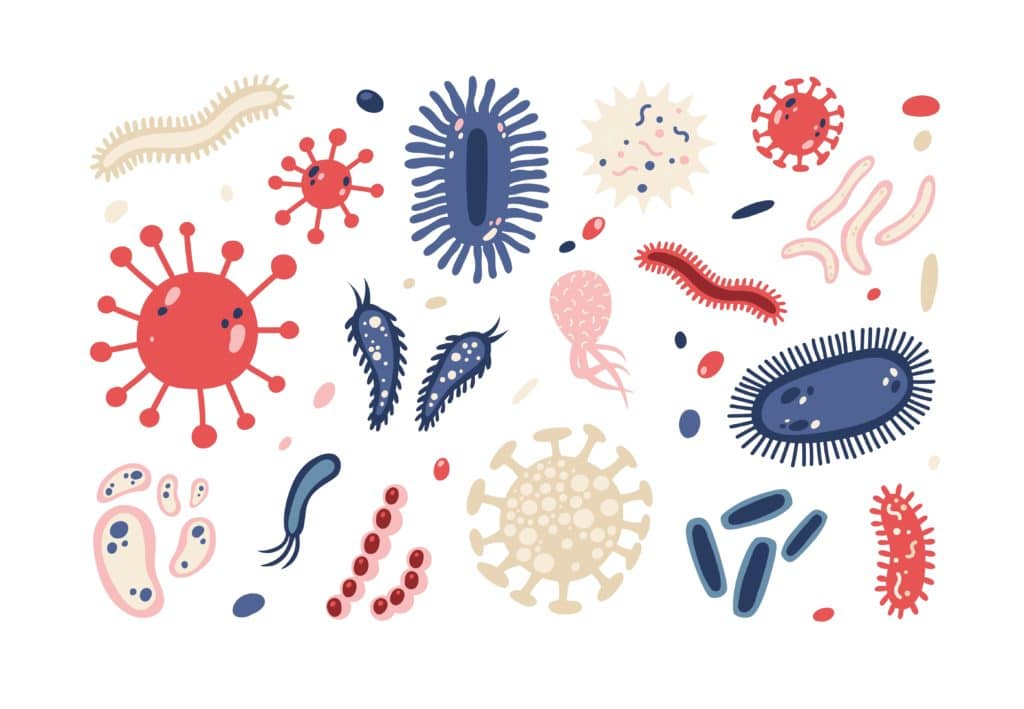Sleep remains an underestimated component of health, and the gut microbiome may be a significant influence. Connections exist between the GI microbiome and sleep physiology. The Gut Brain Axis, variations in the light/dark cycle, inflammation, as well as microbiome abundance and diversity may elucidate factors linking the gut microbiome and sleep physiology. Addressing the Gut Brain Axis may be an avenue to support sleep in tandem with host physiology. — Julia Malkowski, ND, DC
So what does that actually mean?
There is ongoing research and ever increasing evidence that the health of our gut is intricately linked with many major organs in our body. There’s the gut-brain connection, gut-muscle links, gut-mood-behaviour link, gut-diet connection, and if we are talking all things gut related, the big one here is a healthy microbiome – those (good) bugs that inhabit our digestive tract and keep us healthy.
As our gut impacts our health on so many levels, it follows that our gut health also determines the quality, diversity and abundance of our microbiome. Research is supporting this concept with advanced testing methods identifying specific strains and how these relate to our overall wellbeing.
The chicken or the egg?
Hang on, you thought this article relates to gut health? It does. Sometimes it is difficult to determine which comes first, in this case – poor sleep or poor microbiome.
It is well known that shift workers, those working outside the typical 9-5 schedule, suffer adverse health effects including greater rates of obesity, cardiovascular disease and cancer. Furthermore, half of American adults are sleep deprived, sleeping less than 5 hours per day. Sleep physiology plays a significant role in human health. What is unknown, is exactly how an atypical sleep schedule can have such a significant impact. The gut-brain-axis may illuminate this link between sleep and host physiology.
 The gut-brain-axis is a complex system involving many factors including immune, endocrine and hormonal factors, as well as bacteria, microbial mediators, and the vagus nerve. Metabolic changes associated with altered sleep quality may be attributed to factors originating from the gut microbiome, including, but not limited to inflammation, low-grade endotoxemia, insulin resistance and increased intestinal permeability. A variation in the light/dark cycle has been noted to have an impact on the gut microbiome. An alteration in the light/dark cycle as experienced during jet lag is associated with an increase in the Firmicutes phyla – a particular group of microbiota. Partial sleep deprivation has been shown to alter the gut microbiome composition in as little as 48 hours.
The gut-brain-axis is a complex system involving many factors including immune, endocrine and hormonal factors, as well as bacteria, microbial mediators, and the vagus nerve. Metabolic changes associated with altered sleep quality may be attributed to factors originating from the gut microbiome, including, but not limited to inflammation, low-grade endotoxemia, insulin resistance and increased intestinal permeability. A variation in the light/dark cycle has been noted to have an impact on the gut microbiome. An alteration in the light/dark cycle as experienced during jet lag is associated with an increase in the Firmicutes phyla – a particular group of microbiota. Partial sleep deprivation has been shown to alter the gut microbiome composition in as little as 48 hours.
Sleep deprivation leads to inflammation, which has been associated with microbial dysbiosis. Cytokines, inflammatory markers, are strongly associated with sleep physiology. Research has identified that a decrease in sleep results in increased inflammatory cytokine levels. Chronic stress and intestinal mucositis have been shown to increase these inflammatory markers. Stress has been shown to decrease sleep quality and induce intestinal permeability.
Seemingly benign, jetlag is associated with decreased gut microbial abundance and subsequent dysbiosis. Gut microbial diversity is positively correlated with sleep efficiency and total time slept. Abundant and diverse microbiota are positively associated with sleep, with some found to be positively correlated with sleep efficiency and total sleep time. Lactobacillus rhamnosus has been associated with non-REM sleep, and supplementation has been associated with improved sleep quality, even after a stressful exposure.
With various microbial strains being linked to sleep physiology, gut microbial balance is essential to a normal sleep cycle.
So which probiotic should you take?
My response is probably none. The most effective method of maintaining a healthy and balanced microbiome is to ensure optimal gut health. The is the environment in which most of our microbes live and if this environment is unstable, damaged or inhospitable, no amount of supplemental probiotics will fix this.
The most effective approach to ensuring a healthy and diverse microbiome, is following the Gut Ecology and Metabolic Modulation or G.E.M.M. approach. G.E.M.M was developed to mimic the principles of Nature. G.E.M.M is based on replicating the natural processes human cells use to maintain and repair themselves. The initial G.E.M.M. focus is on restoring essential balance within the ecosystem of the gut, rather than on using specific medicines, probiotic supplements or plant extracts to destroy undesirable gut bacteria or other microbes.
Although G.E.M.M. uses several Nature-compatible formulations as medicines to help restore this balance, it relies heavily on specific ‘functional’ foods that send chemical signals to activate protective genes. By ‘talking to’ our genes, these food molecules can beneficially influence repair and minimise the inflammatory processes that lead to disease. In this way, these food molecules act a bit like a volume control that can ‘turn up’ or ‘turn down’ the expression of our genes. With no need for anti-microbials, probiotics or high-dose vitamins, G.E.M.M is a gentle, yet powerful approach for restoring and maintaining good health.
Only trained and accredited clinicians have access to the G.E.M.M. individualised treatment program, with annual upskilling an essential component of ongoing accreditation.
References
- Farré N, Gozal D. Sleep and the Microbiome: A Two-Way Relationship. Sueño y microbioma: una relación bidireccional. Arch Bronconeumol (Engl Ed). 2019;55(1):7-8. doi:10.1016/j.arbres.2018.04.007
- Han M, Yuan S, Zhang J. The interplay between sleep and gut microbiota. Brain Res Bull. 2022;180:131-146. doi:10.1016/j.brainresbull.2021.12.016
- Šiarnik P, Klobučníková K, Mucska I, et al. Obstructive sleep apnea and hypertension: the role of gut microbiome. Obštrukčné spánkové apnoe a arteriálna hypertenzia: úloha črevného mikrobiómu. Vnitr Lek. 2020;66(7):415-419
- Smith RP, Easson C, Lyle SM, et al. Gut microbiome diversity is associated with sleep physiology in humans. PLoS One. 2019;14(10):e0222394. Published 2019 Oct 7. doi:10.1371/journal.pone.0222394
- Vernia F, Di Ruscio M, Ciccone A, et al. Sleep disorders related to nutrition and digestive diseases: a neglected clinical condition. Int J Med Sci. 2021;18(3):593-603. Published 2021 Jan 1. doi:10.7150/ijms.45512
- Wang Z, Chen WH, Li SX, et al. Gut microbiota modulates the inflammatory response and cognitive impairment induced by sleep deprivation. Mol Psychiatry. 2021;26(11):6277-6292. doi:10.1038/s41380-021-01113-1

